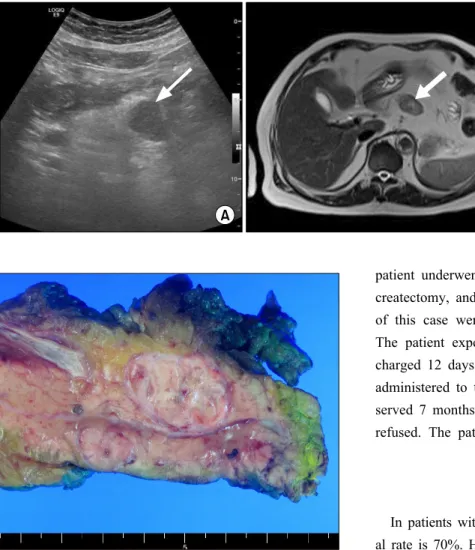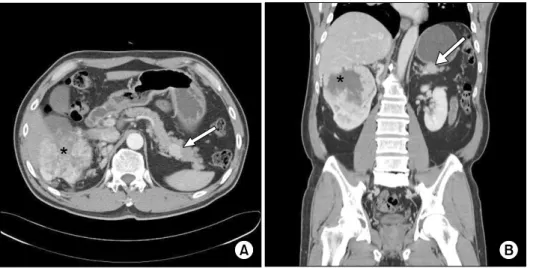Ann Hepatobiliary Pancreat Surg 2017;21:176-179
https://doi.org/10.14701/ahbps.2017.21.3.176
Case Report
Pancreatic resection for renal cell carcinoma metastasis: a case review
Sanghwa Ko1, Sungpil Yun1, Suk Kim2, Tae-nam Kim3, and Hyung-Il Seo1
1Department of Surgery, 2Department of Radiology, and 3Department of Urology, Pusan National University Hospital, Pusan National University School of Medicine and Biomedical Research Institute, Busan, Korea
Renal cell carcinoma (RCC) is the most common type of kidney malignancy. The pancreas is an infrequent site of metastasis in relation to any type of malignancy. However, RCC is one of the tumor types that most frequently metasta- size to the pancreas. In this study, we report our experiences with two patients who underwent pancreatic resection for metastatic RCC tumors; of these two patients, one patient had a tumor was a metachronous pancreas-only tumor, and the other patient’s tumor was synchronous with hematogenous lung metastasis. Following left-side pancreatic re- section, the patients were administered tyrosine kinase inhibitors. (Ann Hepatobiliary Pancreat Surg 2017;21:176-179) Key Words: Renal cell carcinoma; Metastasis; Pancreas
Received: March 4, 2017; Revised: March 29, 2017; Accepted: May 22, 2017 Corresponding author: Hyung-Il Seo
Department of Surgery, Biomedical Research Institute, Pusan National University Hospital, 305 Gudeok-ro, Seo-gu, Busan 49241, Korea Tel: +82-51-240-7238, Fax: +82-51-247-1365, E-mail: seohi71@hanmail.net
Copyright Ⓒ 2017 by The Korean Association of Hepato-Biliary-Pancreatic Surgery
This is an Open Access article distributed under the terms of the Creative Commons Attribution Non-Commercial License (http://creativecommons.org/
licenses/by-nc/4.0) which permits unrestricted non-commercial use, distribution, and reproduction in any medium, provided the original work is properly cited.
Annals of Hepato-Biliary-Pancreatic Surgery ∙ pISSN: 2508-5778ㆍeISSN: 2508-5859
INTRODUCTION
Renal cell carcinoma (RCC) is the most common type of kidney malignancy. Almost one third of patients have synchronous metastatic disease, and 20-50% of patients with this disease experience recurrent metachronous le- sions after nephrectomy.1 The pancreas is a rare site of metastasis for any kind of malignancy, and pancreatic metastasis occurs in only 3-10% of patients.
Approximately 3% of pancreatic tumors represent in- stances of metastatic disease. Solitary metastases from RCC account for 1-4% of pancreatic tumors, and 1-2%
of RCC patients experience metastasis to the pancreas.
Notably, 70% of resectable pancreatic metastases originate from RCC.2 Compared with other RCC metastatic sites, the time interval from nephrectomy, and the survival peri- od, tend to be greater for pancreatic metastases.3 For this reason, in the relevant research literature, patient cases have been described in case reports and retrospective case series. However, the lack of postpancreatectomy fol- low-up data makes it difficult to determine whether re- section is beneficial for survival. In this study, we report our experiences of this multidisciplinary treatment, includ- ing the procedures of pancreatic resection and tyrosine
kinase inhibitor (TKI) administration, utilized in cases of pancreatic RCC metastases.
CASE
Two patients underwent pancreatic resection for meta- static pancreatic tumors at our Department of Surgery.
The tumors were not direct RCC invasion.
One tumor was metachronous and the other was syn- chronous with extrapancreatic metastases. Written in- formed consent forms were obtained from both patients.
Case 1
A 78-year-old man was admitted with a recurrent RCC pancreatic mass. The primary tumor was in the left kidney and had been excised 8 years previously. Following de- tection of the recurrence of the tumor, 16 months had passed without any form of treatment. The size of the pancreatic mass had increased without extrapancreatic metastasis. A well-defined hypoechoic tumor in the body of the pancreas was shown in a transabdominal ultra- sound, and a mass with a heterogeneous signal intensity in T2-weighted magnetic resonance imaging (MRI) scan was detected (Fig. 1). The patient underwent a distal pan-
Sanghwa Ko, et al. Pancreatic metastasis of renal cell carcinoma 177
Fig. 1. Transabdominal ultrasound shows a well-defined hypoechoic mass in the body of the pancreas (arrow) (A). T2-weighted mag- netic resonance imaging (MRI) shows a well-defined mass with heterogeneous signal intensity in the body of the pancreas (arrow) (B).
Fig. 2. Macroscopic appearance of the resected specimen.
createctomy and splenectomy to determine whether the metastasis was a neuroendocrine tumor or an acinar cell tumor. The pathological diagnosis for this patient was a 2.6-cm RCC metastasis without lymph node metastasis, which indicated positive CD10, positive vimentin and negative CK7 immunohistochemically (Fig. 2). The pa- tient experienced no complications and was discharged 11 days after surgery. The TKI VotrientⓇ was administered and the patient remained recurrence-free of tumors for over 24 months.
Case 2
A 56-year-old man was admitted with gross hematuria and was diagnosed with right RCC, pancreatic metastases, and lung metastases. A well-defined homogeneously en- hanced mass at the tail of the pancreas was shown in an abdominal computed tomography (CT) scan (Fig. 3). The
patient underwent a right-sided nephrectomy, distal pan- createctomy, and splenectomy. The pathological findings of this case were a 1.8-cm pancreatic RCC metastasis.
The patient experienced no complications and was dis- charged 12 days after surgery. The TKI SorafenibⓇ was administered to the patient. Disease progression was ob- served 7 months after surgery, but further treatment was refused. The patient died 19 months after surgery.
DISCUSSION
In patients with kidney-limited RCC, the 5-year surviv- al rate is 70%. However, this rate drops to less than 10%
when disseminated metastases occur. Pancreatic meta- stases are rare, as they account for less than 5% of pancre- atic malignancies.4 Generally, pancreatic metastases ap- pear to correlate with a poor prognosis, as well as an early progression of disseminated metastatic disease after pan- creatic metastasis resection. The outcome of the admin- istration of surgical resection in patients depends upon the clinical and biological characteristics of the primary malignancy. Pancreatic RCC metastasis resection is re- ported to be associated with a favorable prognosis.
However, in contrast to liver and lung metastases, no con- trol studies investigating prognosis in the absence of re- section have been conducted in the previous research literature. As such, resection remains a controversial ther- apeutic option.
The preoperative differential diagnosis of a primary pancreatic neoplasm and a metastatic tumor can be diffi- cult and somewhat challenging, especially in metachro- nous cases. Sole metastatic lesions in the pancreas follow- ing nephrectomy are uncommon, and pancreatic meta-
178 Ann Hepatobiliary Pancreat Surg Vol. 21, No. 3, August 2017
Fig. 3. Axial (A) and coronal (B) contrast-enhanced computed to- mography scan images show a well-defined homogeneously en- hanced mass in the tail of the pancreas (arrow). A heteroge- neously enhanced mass with cen- tral necrosis was also detected in the right kidney (*), suggesting renal cell carcinoma.
stasis typically takes a long time to occur. As a result, it can be difficult to distinguish a metastatic mass from a neuroendocrine tumor or acinar cell tumor because of these conditions. In Case 1 of our study, the preoperative magnetic resonance imaging scan showed a hypervascular lesion in the pancreatic tail, which had previously been misdiagnosed from abdominal ultrasonography results as a nonfunctioning neuroendocrine tumor.
The 5-year survival rate following pancreatectomy of isolated pancreatic metastases is estimated at being ap- proximately 70%.2,5,6 Surgery with curative intent has been proposed as the sole option available as a potential cure. Dong et al.7 have suggested that patients without ex- trapancreatic metastases are optimal candidates for pan- creatic resection, based on the Memorial Sloan Kettering Cancer Center (MSKCC) criteria, which are as follows:
lactate hydrogenase level; hemoglobin level; corrected se- rum calcium level; disease-free survival after neph- rectomy; prior radiotherapy; and metastatic sites.8 However, Santoni et al.9 have questioned the use of sur- gery as a potential cure since the 5-year DFS following pancreatic surgery for isolated metastasis is 67%, and their analysis indicates that surgery may not be an in- dependent prognostic factor for good outcomes.
Nevertheless, in patients with isolated pancreatic meta- stases, surgery as part of a multidisciplinary treatment does provide a survival advantage.
Unlike solitary pancreatic metastases, extrapancreatic metastases are associated with a shorter overall survival rate. In Case 2 of our report, a lung metastasis was syn- chronously detected. The patient died 19 months after sur-
gery despite the administration of multidisciplinary treatment. As such, the efficacy of pancreatic resection for pancreatic metastases in the presence of extrapancreatic lesions may need further investigation.
The advent of targeted therapies has changed the treat- ment options for metastatic RCC, and has also dramati- cally improved treatment outcomes.10 Our patients were both treated with targeted therapies after surgery. In Case 1, the patient remained disease-free for 24 months, al- though our other patient died 19 months after surgery.
Santoni et al.9 have shown the outcomes associated with TKI administration; despite inconsistent numbers of pa- tients with solely pancreatic metastases in the groups, Santoni et al. showed that surgery following TKI admin- istration did not produce a statistically significant increase in survival, as compared with the administration of TKIs alone. Surgery and TKI administration were only recom- mended for the highest potential chance of disease-free survival. This needs to be considered further as new target therapies emerge. Large prospective studies investigating TKI administration for metastatic RCC are required to ac- curately determine the criteria for patient selection.
In instances of RCC that have only metastasized to the pancreas, an improved survival rate is associated with smaller single lesions, an absence of symptoms, and a low Memorial Sloan Kettering Cancer Center (MSKCC) score.
In this study, the data for our two patients were not suffi- cient to predict their outcome. We believe that pancreatic resection of solitary RCC metastases may be a good meth- od of achieving local tumor control, although further stud- ies are required to validate this idea.
Sanghwa Ko, et al. Pancreatic metastasis of renal cell carcinoma 179
REFERENCES
1. Bassi C, Butturini G, Falconi M, Sargenti M, Mantovani W, Pederzoli P. High recurrence rate after atypical resection for pan- creatic metastases from renal cell carcinoma. Br J Surg 2003;90:
555-559.
2. Strobel O, Hackert T, Hartwig W, Bergmann F, Hinz U, Wente MN, et al. Survival data justifies resection for pancreatic metastases. Ann Surg Oncol 2009;16:3340-3349.
3. Ballarin R, Spaggiari M, Cautero N, De Ruvo N, Montalti R, Longo C, et al. Pancreatic metastases from renal cell carcinoma:
the state of the art. World J Gastroenterol 2011;17:4747-4756.
4. Thompson LD, Heffess CS. Renal cell carcinoma to the pancreas in surgical pathology material. Cancer 2000;89:1076-1088.
5. Sellner F, Tykalsky N, De Santis M, Pont J, Klimpfinger M.
Solitary and multiple isolated metastases of clear cell renal carci- noma to the pancreas: an indication for pancreatic surgery. Ann Surg Oncol 2006;13:75-85.
6. Tanis PJ, van der Gaag NA, Busch OR, van Gulik TM, Gouma DJ. Systematic review of pancreatic surgery for metastatic renal cell carcinoma. Br J Surg 2009;96:579-592.
7. Dong J, Cong L, Zhang TP, Zhao YP. Pancreatic metastasis of renal cell carcinoma. Hepatobiliary Pancreat Dis Int 2016;15:30-38.
8. Mekhail TM, Abou-Jawde RM, Boumerhi G, Malhi S, Wood L, Elson P, et al. Validation and extension of the Memorial Sloan-Kettering prognostic factors model for survival in patients with previously untreated metastatic renal cell carcinoma. J Clin Oncol 2005;23:832-841.
9. Santoni M, Conti A, Partelli S, Porta C, Sternberg CN, Procopio G, et al. Surgical resection does not improve survival in patients with renal metastases to the pancreas in the era of tyrosine kin- ase inhibitors. Ann Surg Oncol 2015;22:2094-2100.
10. Grassi P, Verzoni E, Mariani L, De Braud F, Coppa J, Mazzaferro V, et al. Prognostic role of pancreatic metastases from renal cell carcinoma: results from an Italian center. Clin Genitourin Cancer 2013;11:484-488.

